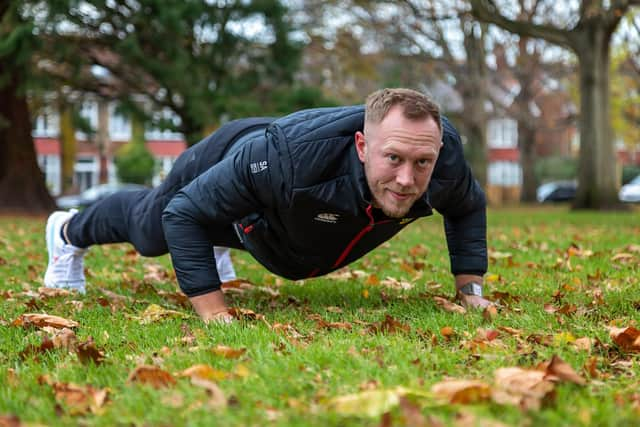Pandemic has changed views on health but life expectancy for men falls for first time in 40 years
and live on Freeview channel 276
The stark figures reveal that life expectancy at birth in the UK in 2018 to 2020 was 79 years for men and 83 years for women - representing a fall of seven weeks for males and almost no change for females from the latest comparison period of 2015 to 2017.
It means life expectancy for men has fallen for the first time since records began 40 years ago.
Advertisement
Hide AdAdvertisement
Hide AdA fall in life expectancy is rare with it normally expected to increase over time.


The pandemic has inevitably made people more aware of their health - with many taking positive action - but perhaps not as much as might be expected.
Personal trainer Michael Newman, of Cowplain, said: ‘You would think the pandemic would be a wake-up call to people but I’ve not seen much of a change.
‘It’s terrible that life expectancy has fallen for men. How is that even possible? Working in health and fitness I want people to have a long happy life so it is sad in 2021 there is a decline.
Advertisement
Hide AdAdvertisement
Hide Ad

‘There needs to be more education in schools on health. I also think people are not cooking as much for themselves. It is so easy to buy a takeaway by pushing a few buttons these days. Some people need a wake up call on what shape they are in.
‘Lockdown created an amazing opportunity for many people to get fit but a lot of people drank and ate. There is still the opportunity and always will be for people to do it. Every good decision leads you on a good path.’
Dave Wells, who runs personal fitness company DJW in Portsmouth, said he had experienced a mix of people taking more interest in their health during the pandemic.
‘I’ve found some people have wanted to improve their health but would rather do it in an outdoor space than in a gym with some still wary of Covid,’ he said.
Advertisement
Hide AdAdvertisement
Hide Ad

‘People have come to me to improve their fitness and are more conscious of their health following the pandemic but it is difficult to say if overall there has been much of a change.
‘From what I saw people were keen to see gyms reopen for their physical and mental health. They are somewhere social and get you out of the house too.’
Harvey Elliott, who runs Workout Coach in Southsea, said: ‘A lot of people have changed their attitude and are taking their health more seriously.
‘It is seen as more of a priority than a chore now - that’s the big difference. It’s more of a lifestyle change and a day to day routine.
Advertisement
Hide AdAdvertisement
Hide Ad

‘We’ve seen a massive increase in numbers with people taking their health and fitness more seriously. It’s more about their health rather than aesthetics now.
‘In lockdown there was not much to do which encouraged people to be proactive and get into fitness. Fitness helps with mental health.
‘We’ve had a big uptake of new clients with people also preferring to be in a Covid secure private studio rather than a big commercial gym.’
Pamela Cobb, from the Office for National Statistics, said: ‘Life expectancy has increased in the UK over the last 40 years, albeit at a slower pace in the last decade.
Advertisement
Hide AdAdvertisement
Hide Ad‘However, the coronavirus pandemic led to a greater number of deaths than normal in 2020. Consequently, in the latest estimates, we see virtually no improvement in life expectancy for females compared to 2015 to 2017 at 82.9 years, while for males life expectancy has fallen back to levels reported for 2012 to 2014, at 79 years.
‘This is the first time we have seen a decline when comparing non-overlapping time periods since the series began in the early 1980s.’


She added: ‘Once the coronavirus pandemic has ended and its consequences for future mortality are known, it is possible that life expectancy will return to an improving trend in the future.’
Helen Atkinson, director of public health at Portsmouth City Council, said there was a ‘difference in life expectancy between the most and least deprived parts of the country, and similar disparities between the most and least deprived parts of Portsmouth’.
Advertisement
Hide AdAdvertisement
Hide AdThe health chief said life expectancy at birth for males currently had a similar gap to that of females when comparing Portsmouth with England (1.4 years difference 2017-2019).
But Ms Atkinson added: ‘This indicator for males has been significantly worse than England since at least 2001/03. However this gap is not widening as quickly as it has been with female life expectancy at birth.
‘The gap between life expectancy at birth for females in Portsmouth and life expectancy at birth for females in England has been widening in recent years. In 2011/13 Portsmouth went from being statistically similar to England to being significantly worse than England for this indicator.
‘The data for 2010/12 showed a difference of 0.4 years (similar) between Portsmouth and England widening to 0.9 years (significantly worse) for 2011/13. This gap has widened further showing a difference of 1.5 years between Portsmouth and England for the most recent data period 2017/19.’
Advertisement
Hide AdAdvertisement
Hide AdMs Atkinson said the pandemic would no doubt have played its role on mortality rates.
She said: ‘It is likely that the pandemic will have widened the gap further as we have seen our most vulnerable residents in our more deprived communities more impacted by Covid-19 over the last 20 months.
‘Our mission as a council is to support the city to recover and renew following the pandemic and to play our part in achieving Portsmouth's City Vision by working together as one council and with our partners and communities, to tackle health, social and economic inequalities.
‘For example, we will be focusing on tackling the underlying causes of ill-health, disability, and early death through the city's Health and Wellbeing Strategy 2021.’
Advertisement
Hide AdAdvertisement
Hide AdSEE ALSO: Over 300 hospital workers not vaccinated
Ms Atkinson, citing research from Public Health England, stressed that people’s choices had a direct impact on their health and mortality figures.
She said figures are ‘driven by higher mortality from heart and respiratory disease, cancer (especially lung cancer), and cirrhosis (in men in particular) all of which is driven by a mix of environmental and lifestyle behavioural factors and most of which are preventable’.
She added: ‘The underlying cause of these diseases are often the outcome of smoking, lack of physical activity, poor diet, harmful drinking, poor housing, lack of education, unemployment, and of course poor air quality and other environmental factors.
‘We have ongoing programmes to engage with those most at risk offering support and advice - often in partnership with others, much of which can be found on our website: www.portsmouth.gov.uk/services/health-and-care/health/.’
A message from the Editor, Mark Waldron
You can subscribe here for unlimited access to our online coverage, including Pompey, for 26p a day.
Comment Guidelines
National World encourages reader discussion on our stories. User feedback, insights and back-and-forth exchanges add a rich layer of context to reporting. Please review our Community Guidelines before commenting.
